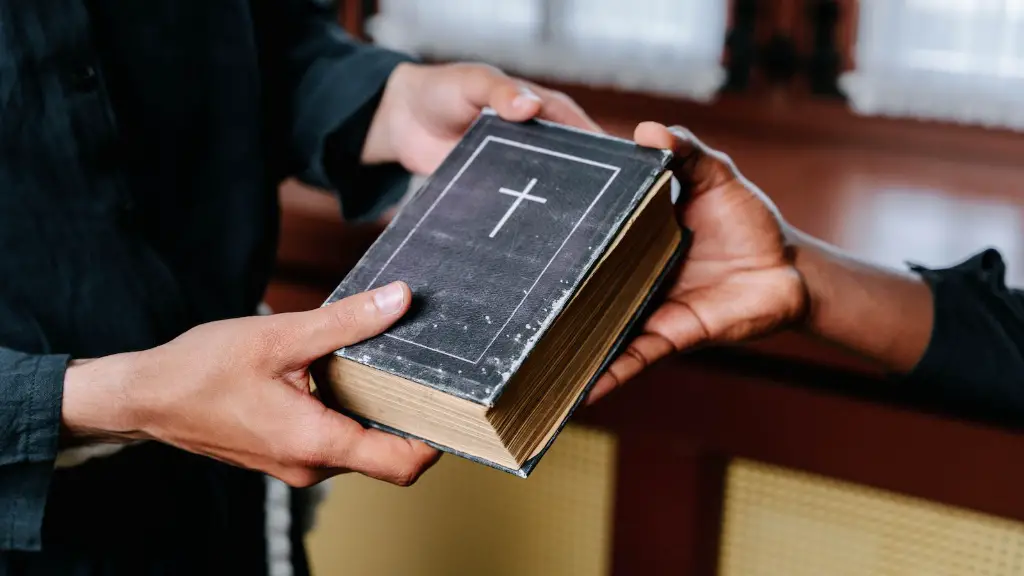The Moabites are mentioned many times in the Bible as a nation that bordered the Promised Land of the Israelites. They were descendants of Lot, the nephew of Abraham. During the time of the Israelite conquest of Canaan, the Moabites were condemned for their wickedness and disobedience towards God. They were also known as fierce enemies of the Israelites. Today, it is still unclear who the Moabites were or exactly where their lands were located.
Historically, there have been several theories on the identity of Moab. Scholars have proposed that the Moabites were related to the Edomites and the Ammonites or that they were a southern nomadic or semi-nomadic people of unknown origin. Most experts generally agree that the Moabites lived in the region east of the Dead Sea, bounded by the Jordan River in the west and the Arabian Desert in the east.
The Hebrew Bible associates the Moabites with the land of Moab and other territory east of the Jordan. In the Book of Numbers, the “king of Moab” is depicted as a powerful ruler over his kingdom. Numerous Moabite cities and strongholds are also mentioned in the Bible, including Ar, Kir and Dibon, as well as Mesha, the king of Moab who is mentioned in several biblical passages. In addition, the Moabites had frequent dealings with the Israelites, from war and peace to trade and migration.
It appears that the Moabites had their own polytheistic religion, worshiping El, Chemosh, and Ba’al, among others. Additionally, archaeological evidence indicates that their culture was heavily influenced by the surrounding nations and adapted many aspects of their neighbors’ customs and beliefs.
Although the Moabites are far less visible in the Bible than many other ancient peoples, their impact on the region and the world has been profound. Not only were they an important and powerful kingdom in the region, but their stories of faith, conflict and justice are still influential today.
From a spiritual perspective, the prominence of the Moabites in the Bible allows readers to learn more about the relationships between history and faith and to gain a greater understanding of God’s plans for reclaiming the Promised Land of the Israelites and establishing them as a nation.
In conclusion, the Moabites remain an interesting but mysterious people in many ways. Their legacy, however, still resonates today in the spiritual and historical lessons that are found in the Bible.
Covenant between God and Moabites
In the Book of Numbers and Book of Deuteronomy, there is an account of a covenant between God and the Moabites. According to this covenant, God promised to help the Moabites against their adversaries and in turn, the Moabites promised to remain loyal to the Israelites and maintain their sincerity to God. This covenant established the Moabites’ relationship with the Israelites and God and helped to ensure their safety.
The covenant also included a promise from the Moabites to give a specific offering to the Lord. In the offering, Moabite worshippers were required to bring a meal offering each time they visited the temple, along with a basket of bread, a “tithe of the tithe”, and a burnt offering. This offering was intended to serve as an expression of their faith and devotion to God. The Moabites’ loyalty to this covenant is praised several times in the Bible.
The covenant between the Moabites and the Israelites is a testament to the trust and respect between different peoples. It shows the importance of understanding and honoring the beliefs and values of others, even in times of conflict. This covenant provides a reminder that the relationships between different cultures can be civil and respectful, and should be treasured.
Moabite Culture and History
The Moabites had a strong culture and history that was largely shaped by their geographical location. Due to their close proximity to the Jordan River and the Dead Sea, the Moabite people were independent seafarers. Their maritime skills enabled them to acquire wealth by trading with nearby peoples.
In addition, the Moabites were known for their skill in the arts, particularly in the art of making war weapons. The Moabite warriors were feared by all and they had a reputation for being ferocious fighters. Furthermore, the Moabites had a strong and vibrant culture that included dancing, singing, and worship.
The Moabites also had their own writing system called the Moabite script, which was largely inspired by the Phoenician alphabet. The Moabites recorded their stories and beliefs, and their writing system was used in all areas of life, including trade and commerce.
Archaeological evidence also indicates that the Moabites had a highly developed society and culture, with their own distinct art and architecture. The discovery of ancient Moabite sites has provided valuable insight into their culture and history.
Moabite Legacy
Despite the terrifying stories of difficulty throughout the Bible, the Moabites were an integral part of biblical history. They provide insight into the lives of other ancient civilizations and are often talked about in comparison to other groups from the same era. Even today, communities around the world take pride in their Moabite ancestry.
The Moabites had a unique and complex culture, which is still visible today in the archaeological remains of their city-states and tombs. The discoveries of artifacts, documents, and other artifacts provide evidence of their culture and faith, and they also offer an insight into the history of the region.
The Moabites’ legacy also lives on in the many stories and teachings that they left behind. Although the stories of their conflict and struggle are upsetting and often difficult to understand, they are an important part of our spiritual and historical understanding. Without the Moabites, the Bible would be far less interesting or meaningful.
The Moabites offer readers an insight into ancient cultures, beliefs, and customs that can help to deepen our understanding of the Bible. They remind us of the importance of faith and trust in times of adversity and also of the importance of respecting and appreciating other cultures and beliefs.
Conclusion
The Moabites remain an important part of the Bible and its history. Although they are often portrayed negatively, they are also an important reminder of the love and mercy of God, and of the profound impact that faith and trust can have on our lives. Their story is an important one and it should be remembered and appreciated.




Thank you for your insight to this tribe that lived near Israel. Well done . Keep writing the vision.